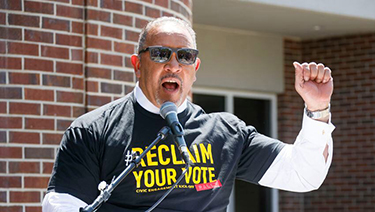Public health has become increasingly politicized, underscoring the need for advocacy and policy that support science.
Marc Morial, JD, president and CEO of the National Urban League, is an expert on public health policy involving social justice and equity. He will be speaking at APHA’s Policy Action Institute June 17-18, which will be held in Washington, D.C., and online.
The Nation’s Health spoke with Morial about the ways policy and elections influence public health.
What is the connection between policy and public health?
People should understand the role that policy plays in the design and the execution of the health care system. Think about the fact that there's still a number of states that have not embraced the expansion of Medicaid. Why? Simply because governors in those states or legislators in those states — public policymakers — have said no, while in other states, public policymakers have said yes.
How do election cycles impact public health?
Let me give an example of a recent public health issue. It's a personal issue, it's a civil rights issue, it's a gender-equity issue — it’s women's right to reproductive health. That decision by the Supreme Court was influenced by the 2016 election.
The fact that the president elected in 2016 got a chance to put three new people on the Supreme Court created the momentum for the overturning of the precedent of Roe v Wade. You bet the elections count. Anyone who doesn't believe elections count is living on Saturn.
How can voters learn about candidate stances on public health issues?
Don't rely on any one source of information. We have newspapers, magazines, professional periodicals. We have websites. A candidate's own website is a very important tool to find out what that candidate stands for and what that candidate's views are. People should avail themselves of multiple sources of information.
I also think people should talk to trusted people in their community, trusted others and say, “What do you think? What do you know that is important?”
If people want to advance public health through civic engagement but aren't sure how to begin, what are your suggestions?
I don't think there's an easy answer. One way is to make sure that organizations — if you're part of a civic organization, if you're part of a faith organization ¬— have a public health initiative.
For public health professionals, they should be involved in public health advocacy organizations, organizations of professionals, organizations of nurses, organizations of doctors, organizations of public health administrators, all of those groups. People will rely on (their knowledge) and look to them. It’s the best vehicle to be involved.
Are there any recent policies that stand out for having particular significance for public health?
The manner in which the public health system responded to COVID-19…we had to stand up as a nation in a short period of time for the research and development of a vaccine and the distribution of that vaccine to millions of Americans, even those who could not pay for it. To me, that was a remarkable example of the public health system and public health leaders driving the response to the greatest public health challenge in modern times. In a relatively short period of time, even though it seemed like ages, the response brought us back to a more normal situation.
My concern is whether we learn lessons from that experience about the need to shore up strength and invest more in the public health system.
What do you plan to explore in your talk at APHA’s Policy Action Institute this month?
We're going to talk about a range of issues that confront the country today. I will talk a little bit about the juxtaposition of the past and the future, and about the National Urban League's focus on 3-D — defending democracy, demanding diversity and defeating poverty. It will also be a call to action for frontline professionals who are working on issues of equity, health equity and social justice every single day.
View the agenda and register for the Policy Action Institute now.
Photo courtesy National Urban League.